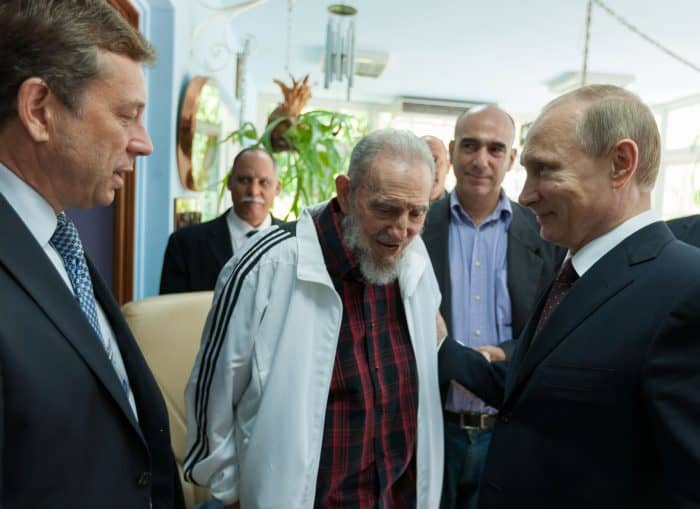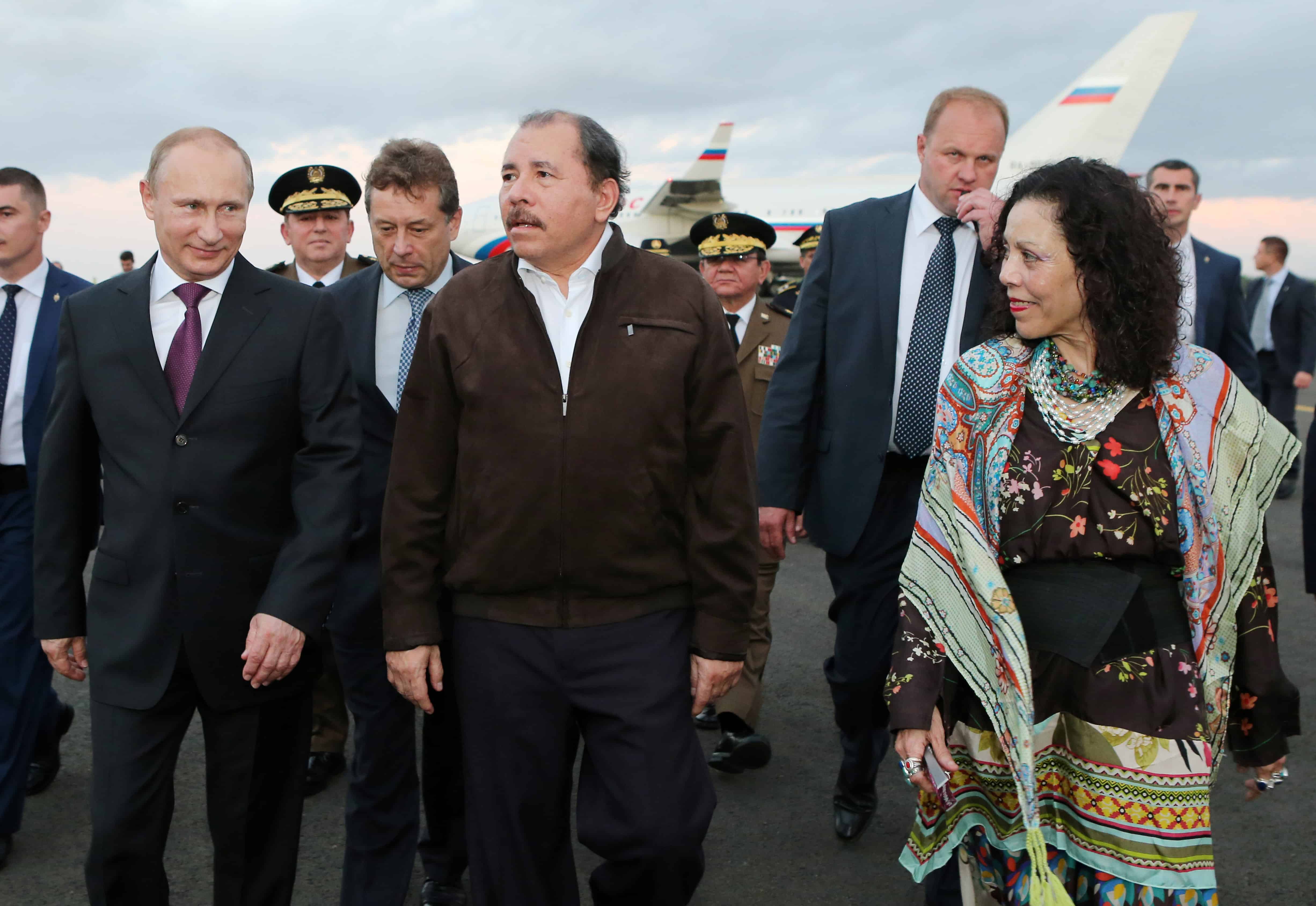MANAGUA, Nicaragua – President Vladimir Putin made a surprise stop in Nicaragua Friday after visiting Russia’s Cold War ally Cuba, part of a tour to increase Moscow’s influence in Latin America amid frayed ties with the West.
Putin’s six-day trip will also take him to Argentina and Brazil, where he will take part in a summit of the BRICS group of emerging countries — an agenda that neatly aligns with his push for a multipolar world at a time when the Ukraine crisis has brought Moscow-Washington relations to a post-Cold War low.
Leftist President Daniel Ortega, whose country was close to the Soviet Union under the Sandinista regime of the 1980s, welcomed Putin at the airport along with his wife and the head of Nicaragua’s army.
“This is the first time that a Russian president visits Nicaragua,” a beaming Ortega said at a brief airport media event.
Through an interpreter Putin said that his government intends to continue strengthening economic ties with the Nicaragua.
Putin said before the trip that he has his eye on Latin America’s oil and bauxite, and plans to woo regional leaders with offers of increased Russian investment and trade in return.
Analysts say that Putin is also using the tour to thumb his nose at Brussels and Washington, which have slapped sanctions on some of his closest allies over Moscow’s takeover of Crimea and support for pro-Russian separatists in Ukraine.
Moscow is seeking comprehensive technological partnerships with Latin America in the oil and gas sector, hydropower, nuclear energy, aircraft construction and the bio-pharmaceutical industry, Putin told Cuba’s state news agency Prensa Latina.
On Saturday, the Nicaragua Dispatch noted that, “Putin’s surprise arrival has fueled rumors that Russia is somehow acting as a silent partner in the canal concession Nicaragua granted to an unknown Chinese company.”
Putin’s visit comes just days after Nicaragua announced that the $40+ billion interoceanic canal project – meant to rival Panama’s canal and bring development to one of the region’s poorest countries – would stretch across el Gran Lago Cocibolca, aka Lake Nicaragua, and construction would begin by the end of the year.
In an interview with the Dispatch, Nicaraguan Gen. Álvaro Baltodano, an economic adviser to Ortega, downplayed Putin’s interest in the canal:
This is a Chinese investment; they are Chinese investors. Who are they going to work with? They are in contact with global companies, from the U.S., Russia, Europe and other parts of the world; China too. …
We are not in a position to build something for geopolitical reasons or other reasons. Here the goals are very clear, and exact, and very transparent.
But clear and transparent are exactly what the canal project is not, Confidencial’s Carlos Chamorro noted this week in an opinion column. Among the unanswered questions, Chamorro said, are: Who is Wang Jing and where does his money come from? Do records exist to allow the Nicaraguan people to investigate where and how Wang amassed his fortune? And why was “a 100-year concession granted to a company via one of the least debated and least transparent laws in the history of Nicaragua?” Who are the investors and what role does Russia play?
Another big concern, according to Chamorro:
It’s clear that to date not one economic or technical feasibility study regarding the canal project exists.
Fidel Castro talks
Putin arrived in Nicaragua after visiting Havana, where he and Cuban President Raúl Castro witnessed the signing of a dozen bilateral agreements, including for oil exploration off the island’s coast, creating an international airline hub in Cuba and supplying equipment for two Cuban thermoelectric plants worth $1.6 billion.
Following Putin’s arrival early Friday, the two men visited a small cemetery that holds the remains of Soviet soldiers who died of illness or accident while serving in Cuba during the Cold War.
The Russian leader then met Castro’s older brother Fidel, the 87-year-old father of the Cuban Revolution.
According to Russian sources, Putin said they had a “long and very interesting conversation” of about one hour on international politics and bilateral relations.
In recent years, Moscow has sought to revive ties with the Caribbean island, whose economy has been saddled with a U.S. embargo since 1962 and is growing less than the government expected, despite recent free-market reforms.
Ahead of the visit, Russia wrote off 90 percent of Cuba’s Soviet-era debt of more than $30 billion.
Havana for its part has sided with its old ally Russia in the Ukraine conflict.

Argentine shale
Putin is next scheduled to fly to Buenos Aires, where analysts say he will likely seek a stake in Argentina’s Vaca Muerta shale formation, an oil and gas field estimated to contain the equivalent of 22.8 billion barrels of oil, potentially one of the largest finds in history.
Argentina, locked out of capital markets since defaulting on its debt in 2001, desperately needs foreign investment.
President Cristina Kirchner will be keen to tap Russian capital at a time when her government is fighting to stay solvent in the face of a U.S. court order to pay more than $1.3 billion by the end of the month to “holdout” hedge funds refusing to take part in the restructuring of the country’s defaulted debt.
Putin has also invited Argentina to take a seat at the table when Brazil, Russia, India, China and South Africa — the so-called BRICS group — hold a summit next week in Brazil.
But first he will attend the World Cup final between Germany and Argentina in Rio de Janeiro on Sunday.
At the end of the tournament, Brazilian President Dilma Rousseff will officially hand over World Cup responsibilities to Putin, whose country hosts the next edition in 2018.
Moscow says he will likely also meet Chancellor Angela Merkel on Sunday.
The Kremlin has sought to play Germany against the United States in the Ukraine crisis, leveraging Berlin’s dependence on Russian gas in a bid to fend off more Western sanctions.
Before departing on the trip Putin condemned as “blatant hypocrisy” Washington’s cyber-spying revealed by fugitive U.S. intelligence analyst Edward Snowden, who is in Russia on asylum.
The remark came after Germany expelled the CIA station chief in Berlin on Thursday over alleged spying on Merkel.






